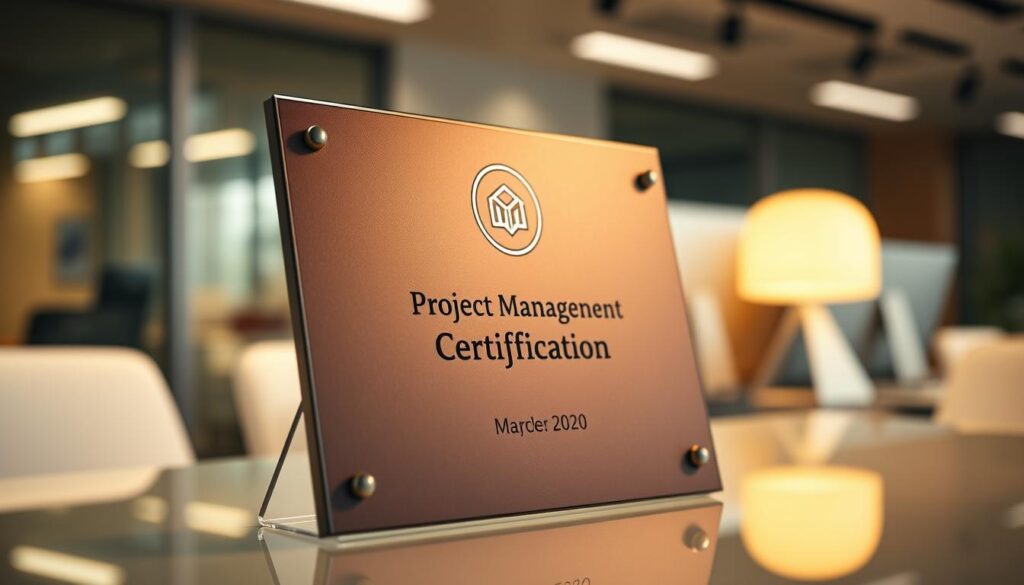What if everything you thought about becoming a project manager was wrong? While many assume you need years of specialized training or a rigid career path, the truth is far more flexible. Project management roles are booming, with the U.S. Bureau of Labor Statistics reporting a median annual salary of $95,370 for specialists in this field. Whether you’re transitioning from another industry or building skills organically, this career offers growth potential that’s hard to ignore.
You don’t need a perfect resume or decades of experience to start. Employers increasingly value transferable skills like team coordination, budget oversight, and deadline management—competencies you might already have. This guide cuts through the noise to show you exactly how to position yourself, even if you’ve never held the official title.
Ready to roboapply with confidence? We’ll break down the seven proven steps that help candidates from all backgrounds secure roles. You’ll learn how to highlight relevant achievements, tailor your applications, and leverage tools that streamline the process.
Key Takeaways
- Project management specialists earn a median salary of over $95,000 annually
- Multiple entry paths exist, including lateral career moves and skill-building
- Employers prioritize demonstrable skills over formal titles
- Actionable strategies replace generic advice for faster results
- Automated tools can accelerate application success
Understanding the Role of a Project Manager
Effective project management requires balancing multiple roles while maintaining clear objectives. Professionals in this field oversee temporary initiatives from kickoff to delivery, acting as strategists, problem-solvers, and connectors between stakeholders. Their core responsibility involves aligning resources, timelines, and team efforts to achieve specific outcomes.
Key Responsibilities and Duties
Daily tasks extend beyond creating Gantt charts or assigning tasks. You’ll coordinate cross-functional teams, resolve conflicts, and track progress against milestones. Budget management and risk mitigation form critical components of the role, requiring both analytical thinking and adaptability.
Communication serves as the backbone of success. Regular updates to executives, collaboration with technical staff, and client negotiations demand polished interpersonal skills. Tools like those outlined in modern workflow platforms help streamline these interactions.
Project Lifecycle Phases
Every initiative follows five stages:
- Initiating: Define goals and secure approvals
- Planning: Develop timelines and allocate resources
- Executing: Implement strategies and manage workflows
- Monitoring: Track metrics and adjust plans
- Closing: Deliver results and document learnings
These phases often overlap, requiring constant reassessment. For example, budget adjustments during execution might necessitate revised stakeholder communications. When preparing tailored application documents, emphasize experiences that demonstrate this cyclical decision-making process.
Assess Your Existing Skills and Experiences
Your journey begins with recognizing hidden strengths. Many professionals underestimate how their daily tasks align with core project management skills. Did you organize a fundraiser? Coordinate a product launch? These activities demonstrate capabilities employers value.

Highlighting Transferable Skills
Identify patterns in your work history. Event planning requires timeline coordination—a direct match for scheduling deliverables. Managing a $10K marketing budget? That’s financial oversight, a critical management skill. Even leading three colleagues during peak hours shows team leadership potential.
Consider this real-world example:
- Volunteer coordinator: Trained 15 team members → Stakeholder management
- Retail supervisor: Reduced stock loss by 18% → Process improvement
- Freelancer: Delivered 95% of client projects early → Deadline prioritization
Mapping Past Experiences to Job Requirements
Job postings often list “3+ years experience” or “cross-functional collaboration.” Connect your background using action verbs. Instead of “helped with office tasks,” write “Streamlined document workflows, cutting approval times by 40%.”
Three years across roles qualifies you for PMP certification—a game-changer for career growth. Use targeted resume summaries to bridge industry gaps. One client transitioned from teaching to tech by framing curriculum development as “stakeholder-focused training programs.”
How to Land Project Manager Job Using RoboApply's Innovative Tools
Standing out in today’s market requires more than qualifications—it demands strategic presentation. RoboApply’s suite transforms generic applications into targeted assets that align with employer needs.
https://www.youtube.com/watch?v=4yMsudS38IE
AI-Driven Customization for Maximum Impact
The platform’s resume builder analyzes job descriptions to emphasize relevant skills. For example, coordinating cross-departmental initiatives becomes “Led 8-member teams across three time zones” with quantifiable results. Built-in ATS optimization ensures keywords like stakeholder engagement and budget tracking appear naturally.
Create cover letters that connect your background to specific opportunities using pre-built templates. One user transitioned from construction supervision to tech PM by highlighting “risk mitigation strategies” instead of “safety protocols.”
Three critical features streamline your search:
- Grammar Checker: Eliminates errors that undermine credibility
- Job Tracker: Organizes deadlines and follow-ups
- Outreach CRM: Manages recruiter communications
These tools work together to handle administrative tasks, letting you focus on crafting compelling narratives. Automated alerts remind you when to follow up on applications, while performance analytics reveal which strategies get interviews.
Building Project Management Experience from Scratch
Launching a career in this field often starts with sideways moves rather than direct jumps. Entry-level positions let you develop core competencies while proving your capabilities. Three pathways stand out for building relevant project management experience without prior titles.

Gaining Practical Experience Through Varied Roles
Start with support positions that expose you to workflows. Project coordinators handle documentation and schedule updates. Operations associates track resource allocation. Junior roles often involve:
- Creating status reports for stakeholder review
- Coordinating team meetings across departments
- Monitoring timelines using tools like Asana
Volunteer for cross-functional initiatives at your current job. Offer to lead a process improvement task force or organize training sessions. These opportunities build planning skills employers value for project management career paths.
Track every achievement systematically. Did you streamline vendor communications? Reduce project delays by 15%? Document these wins with metrics. This portfolio becomes proof of your readiness for level project manager positions.
Most professionals need 2-4 years experience across roles before advancing. Focus on mastering one phase at a time—start with planning, then expand into risk analysis. Consistent growth trumps rushed promotions.
Enhancing Your Resume and Application Documents
Crafting a standout resume requires precision and strategy. RoboApply’s tools transform generic documents into targeted assets that meet employer requirements while showcasing your capabilities. With 75% of applications rejected by automated systems, optimization isn’t optional—it’s essential.
Smart Tools for Competitive Edge
The ATS Optimizer scans job descriptions to identify critical keywords like “stakeholder alignment” or “budget forecasting.” It then restructures your content to match:
- Convert “Managed teams” → “Directed 12-member cross-functional group, delivering $1.2M initiative under budget”
- Replace “Handled schedules” → “Optimized timelines for 23 concurrent projects, achieving 98% on-time completion”
Grammar Checker eliminates subtle errors that undermine credibility. One user increased interview requests by 40% after fixing inconsistent verb tenses and passive voice. “The platform flagged my vague statements and suggested measurable outcomes,” reports a tech PM candidate.
Tailor materials for different industries using assistant project manager resume examples. Construction roles emphasize risk mitigation, while IT positions highlight Agile methodologies. Certifications appear dynamically based on job specifications—PMP badges for corporate roles, Scrum Master credentials for startups.
Maintain consistency across documents with Branding Sync. This feature ensures matching fonts, colors, and terminology in resumes, cover letters, and LinkedIn profiles. Automated version control lets you customize applications without starting from scratch.
Developing Key Project Management Skills and Certifications
Mastering the right blend of abilities separates competent professionals from exceptional leaders. This dual focus on interpersonal and technical expertise positions you for success across industries. Let’s explore how to build these competencies strategically.
Must-Have Soft Skills for Effective Leadership
Strong communication forms the foundation of every successful initiative. Practice active listening during team meetings to identify unspoken concerns. Role-play negotiation scenarios with colleagues to refine conflict resolution techniques. For example, resolving resource disputes often requires balancing empathy with data-driven proposals.

- Lead volunteer initiatives to practice stakeholder alignment
- Attend workshops on decision-making frameworks like OODA Loop
- Document lessons from past collaborative challenges
Technical Proficiency and Relevant Certifications
Modern teams expect fluency in tools like Trello for task tracking and Slack for real-time updates. Start with free versions to build hands-on experience. Many professionals begin with entry-level credentials like CAPM, which requires 23 hours of formal education rather than work experience.
Consider these certification pathways:
- Early Career: PRINCE2 Foundation (process-focused)
- Mid-Level: PMI-ACP (Agile methodologies)
- Senior Roles: PMP (requires 36 months leading projects)
Platforms like Coursera offer PMP prep courses that count toward education requirements. Pair certifications with practical application—manage a community event using Asana to demonstrate both knowledge and execution skills. For resume optimization strategies, review these project manager resume examples that highlight technical and leadership competencies effectively.
Tips for Acing Project Manager Interviews
Interviews for these roles test more than technical know-how—they reveal how you handle real-world pressures. Prepare to discuss specific scenarios where you guided teams through challenges. Structure responses using the STAR method to showcase problem-solving abilities clearly.

Common Interview Scenarios and How to Prepare
Expect behavioral questions like “Describe a time you resolved team conflict.” Focus on actions you took, not just outcomes. Example response:
- Situation: Two developers disagreed on feature priorities
- Action: Facilitated compromise through workload analysis
- Result: Delivered MVP two weeks early
Technical questions often cover Agile vs. Waterfall differences. If inexperienced, highlight transferable project management skills: “While new to Scrum, I’ve led cross-departmental sprints using similar principles.”
RoboApply’s interview coach analyzes your mock responses, suggesting improvements in pacing and keyword usage. One user increased callback rates by 60% after refining their delivery style.
Close by asking about the company’s biggest current initiative. This demonstrates strategic thinking while gathering intel to assess role fit.
Leveraging Internship and Direct Entry Opportunities
Breaking into project management doesn’t always require prior titles—targeted entry points exist for driven candidates. Start by researching companies offering structured apprenticeships like IBM’s Project Manager Apprenticeship Program, which combines paid work with PMP certification prep. These roles let you earn while mastering Agile methodologies and stakeholder management.
Identify entry-level positions such as operations coordinator or junior project manager. Use LinkedIn filters to find “associate project manager” roles with training components. Tailor your resume using tailored application materials that highlight transferable skills like budget tracking or team leadership from non-PM roles.
Three actionable steps:
- Attend industry meetups to connect with hiring managers in your target field
- Apply for rotational programs at tech firms or healthcare systems
- Volunteer to lead small-scale initiatives at local nonprofits
Track every task you oversee, even unofficially. Documenting how you streamlined workflows or resolved conflicts builds evidence for interviews. With strategic positioning and persistence, these opportunities become springboards to full project management roles.
FAQ
Can I become a project manager without direct experience?
Yes. Highlight transferable skills like team coordination, budgeting, or timeline management from past roles. Use RoboApply’s AI tools to align your resume with project management job requirements, emphasizing leadership in cross-functional tasks or volunteer work.
What certifications boost credibility for project manager roles?
PMP Certification (Project Management Professional) and CAPM (Certified Associate in Project Management) are industry gold standards. Agile certifications (Scrum Master, SAFe) also add value. RoboApply’s ATS Optimizer ensures certifications are prioritized correctly in your application.
How do RoboApply’s tools improve my job search?
The AI Resume Builder tailors content to match project manager job descriptions, while the Grammar Checker eliminates errors. The ATS Optimizer increases visibility by formatting resumes for applicant tracking systems, ensuring keywords like “risk management” or “stakeholder engagement” are included.
What soft skills matter most for project managers?
Prioritize communication, conflict resolution, and adaptability. Demonstrate these through examples like mediating team disputes or adjusting project scopes mid-cycle. During interviews, use RoboApply’s prep guides to structure STAR-method responses around these competencies.
Are internships necessary for landing entry-level positions?
While not mandatory, internships provide practical experience in tracking deliverables or managing resources. RoboApply’s job search tools identify direct-entry opportunities at firms like IBM or Deloitte, which often hire candidates with hands-on training from internships or freelance projects.
How do I answer situational interview questions?
Use the STAR framework (Situation, Task, Action, Result). For example, describe a delayed project phase, your role in reallocating resources, and the on-time delivery outcome. RoboApply’s interview prep modules include common scenarios like budget cuts or scope changes to practice with.


















